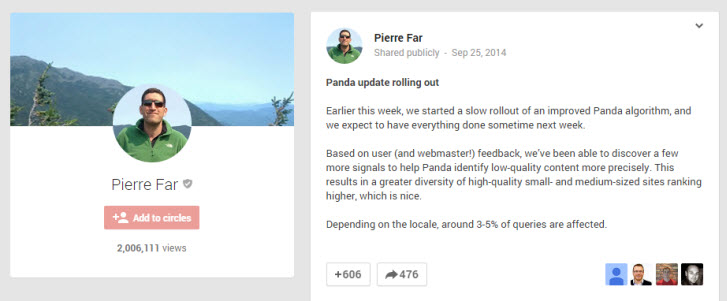This past September, Google pushed the last Panda update, which Search Engine Land has dubbed “Panda 4.1” due to it being a “small” iteration vs. a major update. The announcement was broadcast by Google’s Webmaster Trends Analyst, Pierre Far via Google+ post. Four months in, and the search engine giant is still rolling out the update. It’s a slow process and sites that weren’t affected in it’s initial roll out, will start to see its effect soon. With this update, 2 things come to mind: (1) How does this affect the hospitality industry; (2) How can hotels reap the benefits from this update?
How does Google’s Panda 4.1 affect the hospitality industry?
Panda updates are focused on content quality, making sure that redundant, irrelevant, and spammy content are excluded from Google’s Index. According to Mr. Far, “Based on user (and webmaster!) feedback, we’ve been able to discover a few more signals to help Panda identify low-quality content more precisely,” further disclosing that this should help small to medium-sized sites that provide unique and high-quality content and will affect 3-5% of queries depending on locale.
With more focus on helping out small to medium-sized sites, we see that hotels with independent websites that provide original, relevant, high-quality content will see the greatest benefit from this update as it gives them a fighting chance against bigger sites such as brand.com and OTAs.
On the flip side, sites that ignore webmaster guidelines and contain borrowed or thin content (100 words or less) will get penalized.
How hotels can optimize for Google’s Panda 4.1?
As previously mentioned, this update is focused on providing searchers with the best results to their query by penalizing poor quality, thin content sites and rewarding those that provide high-quality, original content. Hotels can reap the benefit from Panda 4.1 by ensuring they:
- Always have original, quality content on the site. Never duplicate content for 2 reasons: (a) that’s plagiarism; and (2) Google will penalize the site.
- Focus on user-friendly content. Don’t focus too much on serving the search engines, but rather make sure that the site provides useful content that the target audience searches for.
- Create fresh content on a regular basis as search engines love new content. Having a destination blog or allowing guests to leave reviews on the site can help with this.
- Take advantage of social channels. Share useful and engaging content about the hotel on its social media channels – such as unique selling points, specials and promotions, activities, and local events.
Overall, we have seen uplifts on Milestone websites as we follow Google’s webmaster guidelines when developing sites and creating content for our clients.
For more information about how Milestone can help with your hotel marketing strategy, click here to contact us.
______________________________________
Contributed by:
Stephen Fitzgerald, Senior VP of Sales
Teresa Villaruz, Sr. Marketing Manager



